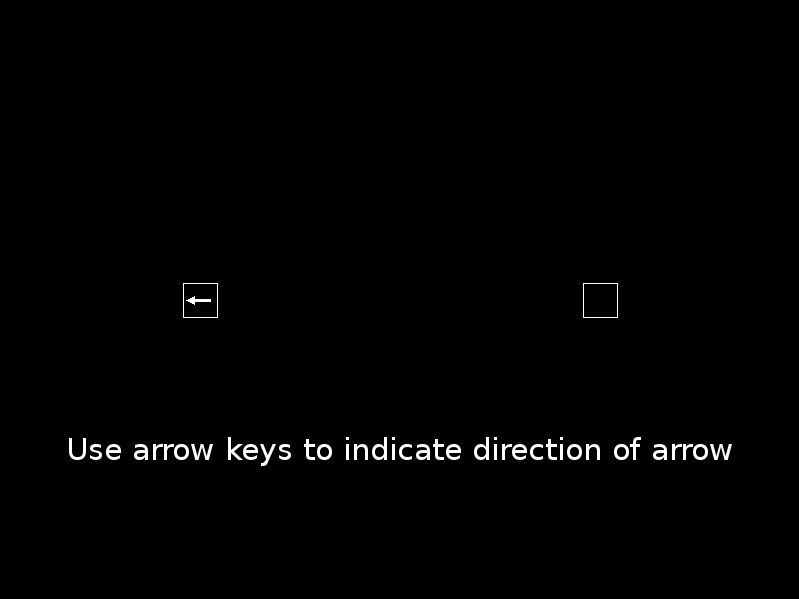Antisaccade Task

System Requirements
Minimum: 1280×800
Recommended: 1280×800
Description
An inhibitory control task requiring participants to suppress the reflexive tendency to look at a peripheral cue. A cue appears on one side of the screen, followed by an arrow target on the opposite side. Participants must indicate the arrow's direction while avoiding looking at the initial cue, which would impair target perception. Involves a screen calibration routine so users can calibrate eccentricity based on paper, ruler, or credit card.
Test Details
antisaccadeantisaccade.pbl🚀 Try Without Registration
Run this test immediately without creating an account. Data stays in your browser.
Researcher Access Benefits
To save configurations, upload data, use translations, track completion, and manage studies, please log in or register for an account.
Scientific Background
Original Task References:
These references describe the original task that this PEBL implementation is based on.
- Roberts, R. J., Hager, L. D., & Heron, C. (1994). Prefrontal cognitive processes: Working memory and inhibition in the antisaccade task. Journal of Experimental Psychology: General, 123(4), 374-393.
Data Output
Creates two data files: (1) antisaccade-<subnum>.csv with trial-level data including subnum, block, trial, practice flag, cue type, target location (top/bottom), target direction, flanker coherence, flanker direction, timestamps, delay, response, correctness, reaction time, and bivalent correctness (correct direction axis); (2) antisaccade-report-<subnum>.txt with summary statistics including overall accuracy, bivalent accuracy (LR vs UD discrimination), and mean response time.
Example Data
| subnum | screensize | block | trial | direction | stim | fixationstart | delaytime | promptstart | arrowstart | maskstart | rt | corresp | resp | corr | bivalentcorr |
|---|---|---|---|---|---|---|---|---|---|---|---|---|---|---|---|
| 1515 | 1920x1080 | P | 0 | -1 | U | 54128 | 1500 | 55628 | 56130 | 56130 | 718 | <up> | <up> | 1 | 1 |
| 1515 | 1920x1080 | P | 0 | 1 | D | 56851 | 2500 | 59351 | 59853 | 59853 | 510 | <down> | <down> | 1 | 1 |
| 1515 | 1920x1080 | P | 0 | -1 | L | 60369 | 2750 | 63120 | 63621 | 63621 | 614 | <left> | <left> | 1 | 1 |
| 1515 | 1920x1080 | P | 0 | 1 | R | 64237 | 2500 | 66737 | 67239 | 67239 | 700 | <right> | <right> | 1 | 1 |
| 1515 | 1920x1080 | P | 0 | 1 | R | 67947 | 3250 | 71198 | 71700 | 71700 | 619 | <right> | <right> | 1 | 1 |
| 1515 | 1920x1080 | P | 0 | 1 | R | 72320 | 2000 | 74320 | 74822 | 74822 | 660 | <right> | <right> | 1 | 1 |
| 1515 | 1920x1080 | P | 0 | -1 | R | 75484 | 3000 | 78484 | 78987 | 78987 | 614 | <right> | <right> | 1 | 1 |
| 1515 | 1920x1080 | P | 0 | 1 | R | 79603 | 3000 | 82603 | 83104 | 83104 | 539 | <right> | <right> | 1 | 1 |
| 1515 | 1920x1080 | P | 0 | -1 | L | 83645 | 2000 | 85645 | 86147 | 86147 | 703 | <left> | <left> | 1 | 1 |
Sample data showing typical output format. Actual values will vary by participant.
About This Test
An inhibitory control task requiring participants to suppress the reflexive tendency to look at a peripheral cue. A cue appears on one side of the screen, followed by an arrow target on the opposite side. Participants must indicate the arrow's direction while avoiding looking at the initial cue, which would impair target perception. Involves a screen calibration routine so users can calibrate eccentricity based on paper, ruler, or credit card.
Category: Executive Function
Estimated Duration: 9 minutes
Available Translations: 7 languages
Documentation Sources:
Test implementation, Parameter schema
Documentation Status: Standard